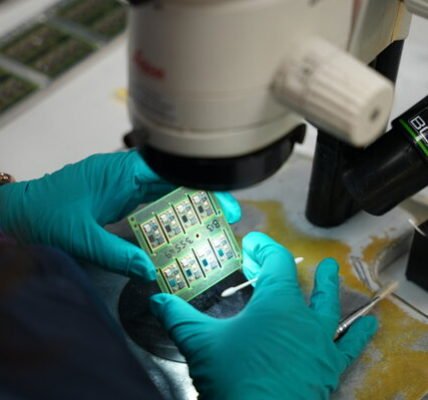By Ian YoungsEntertainment & arts reporter

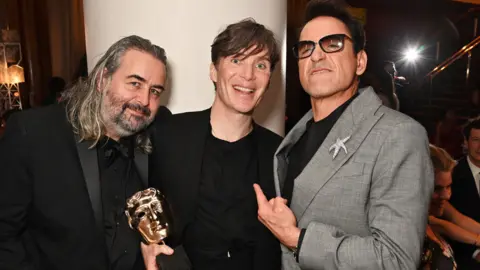 Getty Images
Getty Images
Cillian Murphy, Robert Downey Jr and director Christopher Nolan were all honoured for their work on Oppenheimer as the film dominated the Bafta Awards.
Murphy was named best actor for playing J Robert Oppenheimer, known as the father of the atomic bomb, while Downey Jr won best supporting actor.
The drama won seven Baftas including best film. Poor Things picked up five, including best actress for Emma Stone.
Best supporting actress went to Da’Vine Joy Randolph for The Holdovers.
Oppenheimer and the acting winners could well repeat their successes at the Oscars in three weeks – although Oscar and Bafta voters rarely totally agree.
In a surprise appearance, Michael J Fox announced Oppenheimer as the winner of best film, the top prize at Sunday’s ceremony. The 62-year-old, who has had Parkinson’s disease for more than 30 years, received a standing ovation from the audience.
Murphy told the ceremony after winning the first Bafta of his career: “Oh boy. Holy moly. Thank you very, very much Bafta.”
The Irish actor paid tribute to his “Oppenhomies” and praised Nolan, adding: “Thank you for always pushing me and demanding excellence because that is what you deliver time and time again.”
It was the British director’s first Bafta win, too, following a career that has also encompassed Dunkirk, Inception and The Dark Knight.
Nolan thanked a cast led by the “peerless and fearless Cillian Murphy” and also acknowledged the film’s backers “for taking on something dark”.

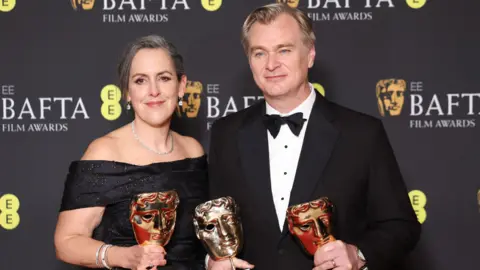 EPA
EPA
Downey Jr’s win came 31 years after his previous Bafta victory, for the 1993 film Chaplin – a new record for the longest gap between wins by any performer.
The actor played Oppenheimer’s adversary Lewis Strauss following his stint as Tony Stark/Iron Man in a string of Marvel films.
He thanked Nolan, telling the audience: “Recently that dude suggested I attempt an understated approach as a last-ditch effort to resurrect my dwindling credibility.”
The Bafta Awards’ top films
- 7 wins – Oppenheimer
- 5 – Poor Things
- 3 – The Zone of Interest
- 2 – The Holdovers
Stone picked up her second career Bafta, recognised for playing a British woman who is reanimated after being given the brain of a baby in steampunk fantasy Poor Things.

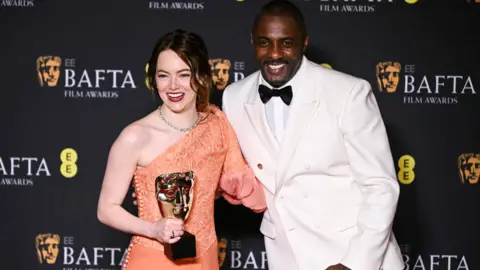 Getty Images
Getty Images
Meanwhile, Randolph was rewarded for playing Mary, the head of a school kitchen and a grieving mother in The Holdovers, about the staff and pupils who stay in a US boarding school during the Christmas holidays in 1970.
In her acceptance speech, she became emotional as she paid tribute to “countless Marys throughout history, who have never got a chance to wear a beautiful gown and stand on this stage in London”.
The US actress added: “Telling her story is a responsibility that I do not take lightly.” The Holdovers also won best casting.
This was the second year in a row that no Britons won any of the four acting prizes at the most prestigious night in the British film calendar.

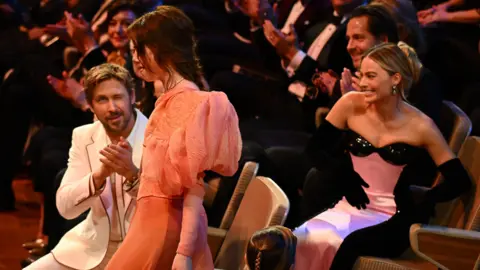 Getty Images
Getty Images
The award for best British film went to The Zone of Interest, about the concentration camp commander and his family who lived next to Auschwitz during World War Two.
The drama – made by British director Jonathan Glazer, filmed in Poland and acted mainly in German – also won best film not in the English language and best sound.
Meanwhile, The Boy and the Heron, made by legendary animator Hayao Miyazaki, became the first Japanese production to win best animated film.
The two awards for best screenplay went to suspenseful French courtroom drama Anatomy of a Fall and American Fiction, a satire about a US novelist who is dismayed when his spoof of the “black genre” of books becomes a runaway hit.
Samantha Morton was given the Bafta Fellowship, the organisation’s highest honour, and paid tribute to children in care in her acceptance speech: “I dedicate this award to every child in care, or child who has been in care and who didn’t survive.”
Morton herself grew up in the care system in Nottingham.

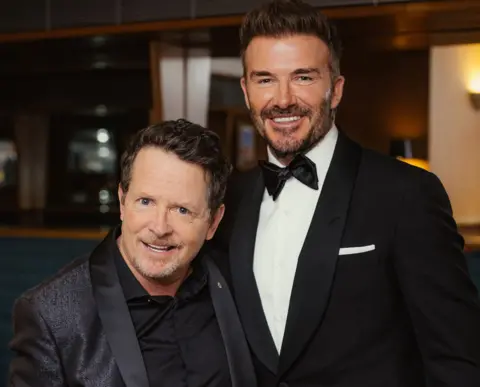 Getty Images
Getty Images
Former Doctor Who star David Tennant hosted the ceremony in a kilt, referring to box office blockbuster Barbie in his opening monologue, joking that the ceremony was “going to go smoother than Ken’s chest”.
However, it didn’t go to plan for Barbie, which didn’t take home any awards despite being last year’s most successful box office film and having five Bafta nominations.
Other films that had multiple nominations but lost out on the night included Killers of the Flower Moon, Maestro, All of Us Strangers and Saltburn.
Sophie Ellis-Bextor was among the performers, continuing the remarkable resurgence of her 2001 hit Murder on the Dancefloor after it was used to soundtrack a scene in Saltburn in which Barry Keoghan dances naked around a stately home.
In a nod of the film, the dancers were intended to look like upper-class partygoers – but they were all fully-clothed.
The Prince of Wales, Bafta’s president, took his place in the audience among the Hollywood superstars in his first high-profile royal engagement since his wife Kate’s recent operation.
Read more about this year’s Bafta winners:
- Oppenheimer: Cillian Murphy film marches towards Oscars success
- Poor Things: Emma Stone: Sex scenes in Poor Things are ‘honest’
- The Zone of Interest: Auschwitz film was ‘like Big Brother’ in house next to camp
- The Holdovers: The Holdovers: Could it be a new Christmas classic?
- American Fiction: White audiences ‘too comfortable with black clichés’
- 20 Days in Mariupol: Award-winning film in town’s ‘Ukrainian Sunday’
- How to Have Sex: How to Have Sex: The film tackling consent head-on


